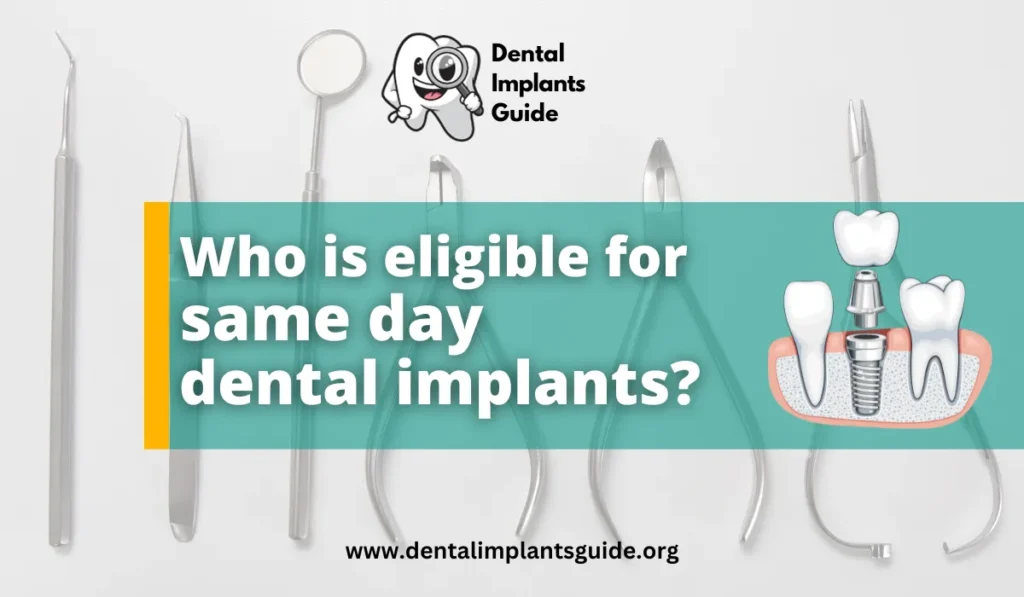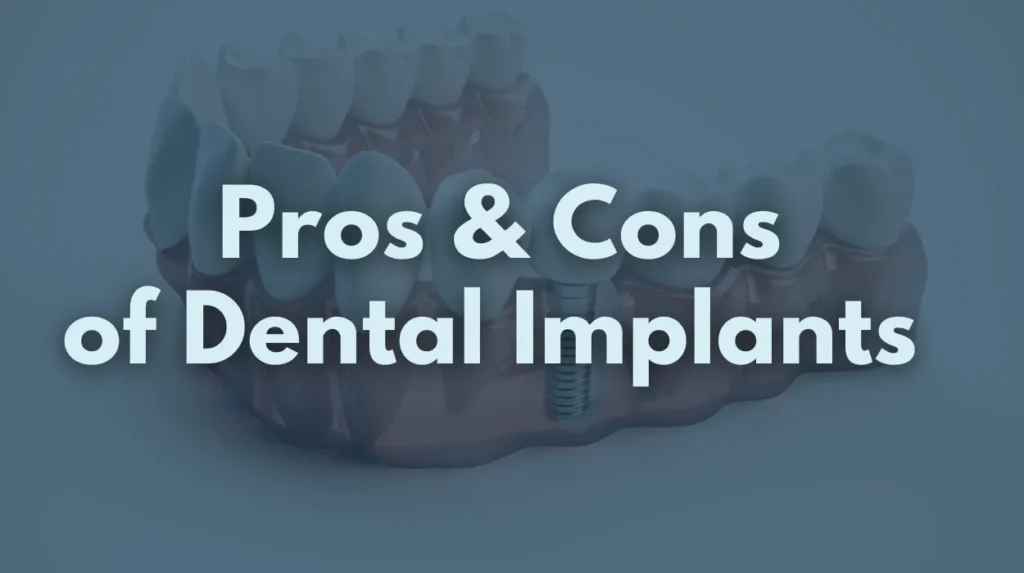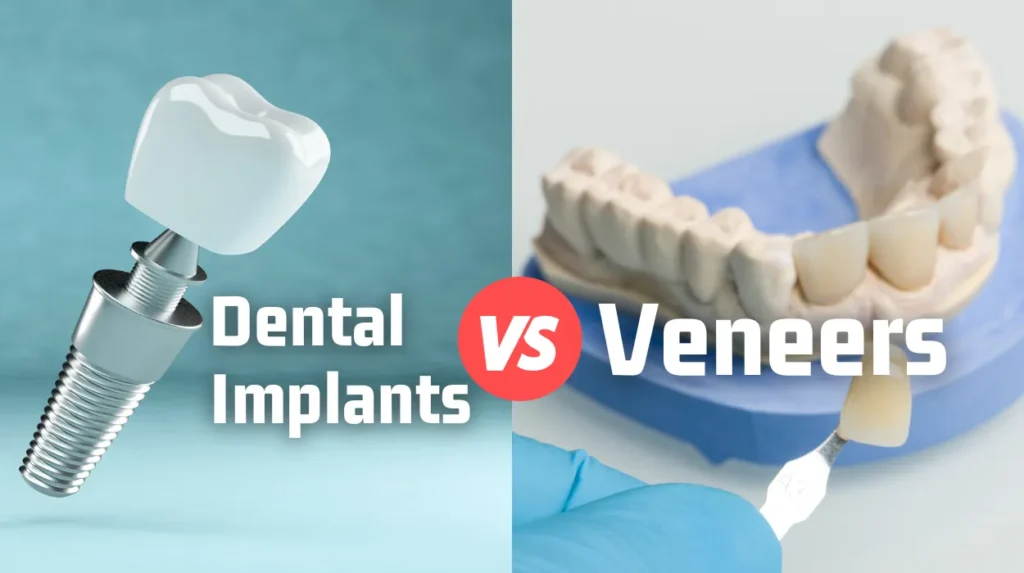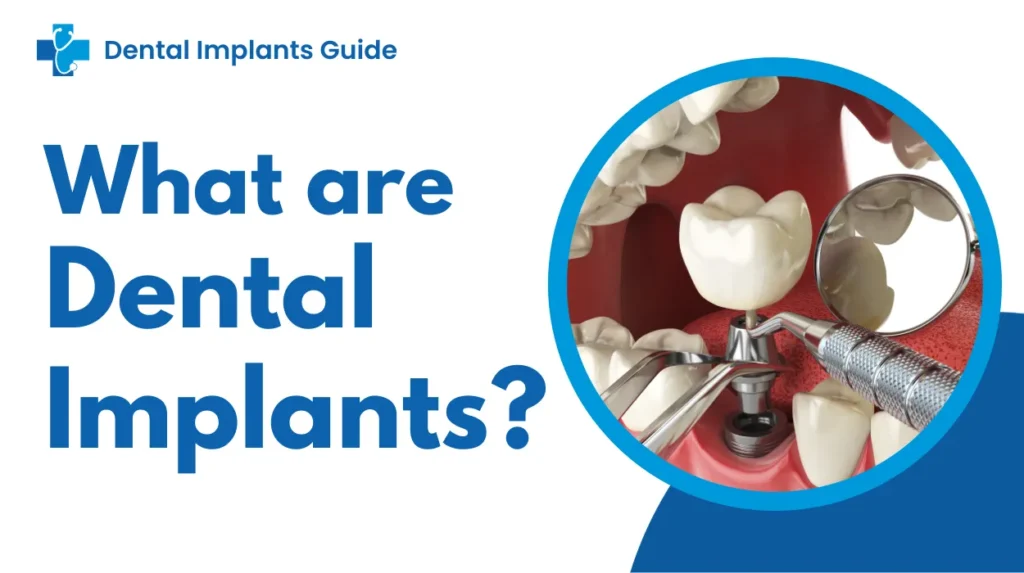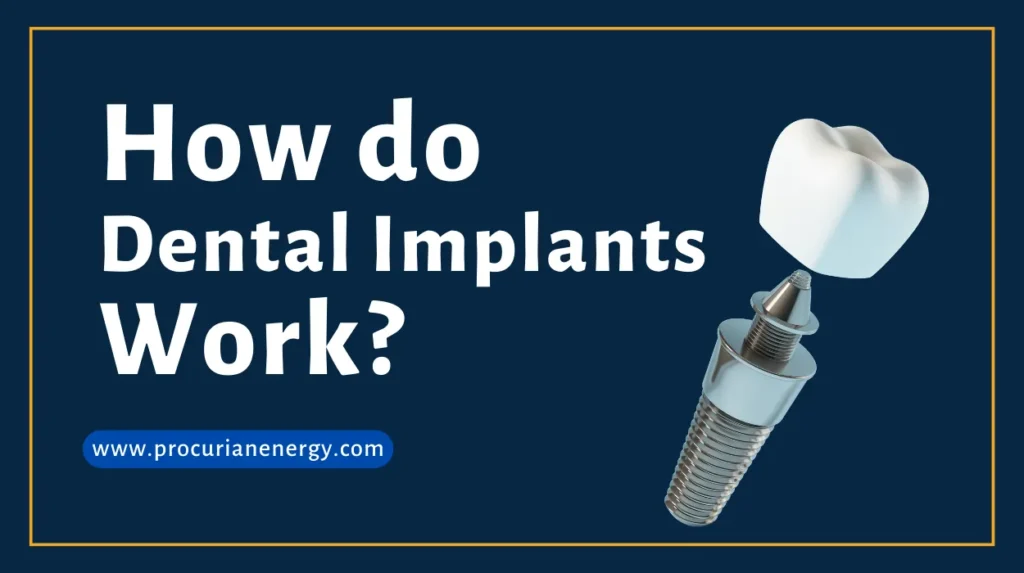
Are you missing a tooth or two and wondering how you can get your smile back? Dental implants might be the answer you’ve been looking for.
We’ll take you step by step through the entire process in this simple guide so you can feel confident choosing what’s best for your oral health.
What Are Dental Implants?
Dental implants are like magic anchors for your teeth. They are small, sturdy metal posts, typically made of titanium, that are surgically placed into your jawbone.
These metal posts act as replacement tooth roots, providing a secure foundation for artificial teeth.
Parts of a Dental Implant
Understanding the different parts of a dental implant is crucial to grasp how they work together to restore your smile. Here are the main components:
1. Implant Body
The implant body is the part that’s inserted into your jawbone. It’s usually shaped like a screw and serves as the anchor for your new tooth.
2. Abutment
The abutment is a connector piece that sits on top of the implant body. It serves as a link between the implant and the artificial tooth.
3. Artificial Tooth
The artificial tooth, also known as a crown, is the visible part of the implant. It’s custom-made to match your natural teeth, ensuring a seamless smile.
The Dental Implant Procedure
Now, let’s dive into the step-by-step process of getting dental implants:
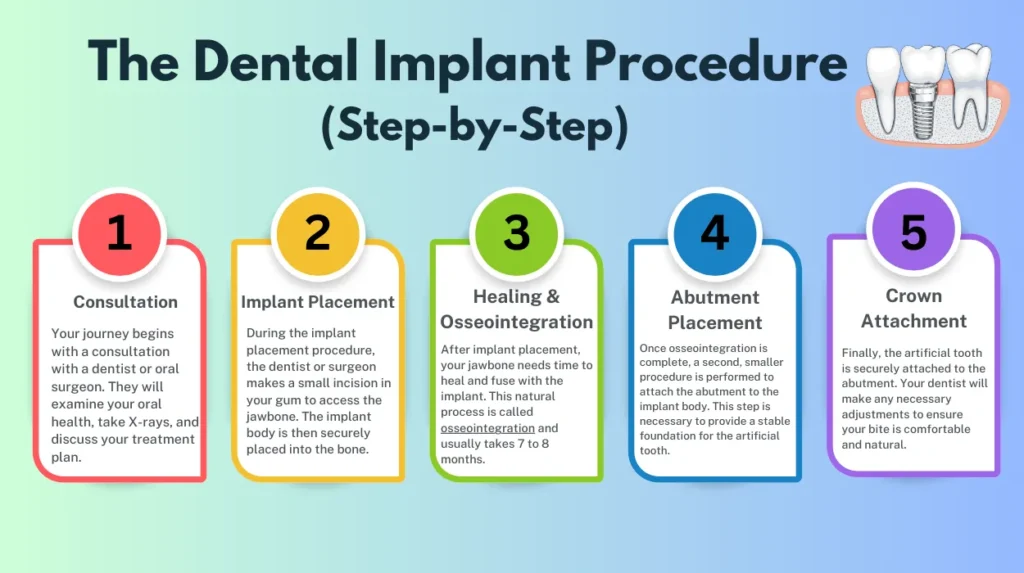
Step 1: Consultation
Your journey begins with a consultation with a dentist or oral surgeon. They will examine your oral health, take X-rays, and discuss your treatment plan.
Step 2: Implant Placement
During the implant placement procedure, the dentist or surgeon makes a small incision in your gum to access the jawbone. The implant body is then securely placed into the bone. This process is typically done under local anesthesia, ensuring you feel minimal discomfort.
Step 3: Healing and Osseointegration
After implant placement, your jawbone needs time to heal and fuse with the implant. This natural process is called osseointegration and usually takes 7 to 8 months.
Step 4: Abutment Placement
Once osseointegration is complete, a second, smaller procedure is performed to attach the abutment to the implant body. This step is necessary to provide a stable foundation for the artificial tooth.
Step 5: Impressions
Your dentist will take impressions of your teeth to create a custom artificial tooth (crown) that matches the size, shape, and color of your natural teeth.
Step 6: Crown Attachment
Finally, the artificial tooth is securely attached to the abutment. Your dentist will make any necessary adjustments to ensure your bite is comfortable and natural.
Types of Dental Implants
The different types of dental implants are:
1) Single-Tooth Implant – This is like a magic replacement for one missing tooth. It’s like having a new tooth that’s anchored into your jawbone.
2) Subperiosteal Implants – These are implants that sit under the gum but on top of the jawbone. They are used when the bone isn’t strong enough for other types of implants.
3) Endosteal Implants – These are the most common type of dental implants. They go directly into the jawbone and are like screws that hold your new tooth in place.
4) Zygoma Implants – Zygoma implants are used when you don’t have enough bone in your upper jaw. They attach to your cheekbone (zygomatic bone) instead of the regular jawbone.
5) All-on-4 Implants – This is a special technique where four implants are placed in your jaw to support a full set of teeth. It’s a quicker way to get a whole new smile.
6) Traditional Implants – These are like the standard dental implants. They go into your jawbone and are used for replacing single teeth or multiple teeth.
7) Mini Implants – Mini implants are smaller and thinner than regular implants. They are often used for smaller teeth or if you don’t have enough bone for bigger implants.
Cost of Dental Implants
The cost of dental implants can vary depending on various factors, including the number of implants needed, the type of restoration (single tooth, bridge, or full dentures).
To help you get a clearer picture for the pricing, click here→cost of dental implants.
Note: If you’re not able to afford dental implant surgery, consider exploring options like dental implant grants. These programs may provide financial assistance or discounts to help cover the cost of the procedure. Even if you didn’t get approved for the grants, here are some insurance that covers Dental implants.
Benefits of Dental Implants
Now that you know how dental implants work, let’s explore why they’re a fantastic choice:
- Natural Look and Feel – Dental implants closely mimic your natural teeth, so no one will even notice you’ve had dental work done.
- Improved Chewing and Speech – With dental implants, you can chew your favorite foods comfortably and speak without any slurring or discomfort.
- Long-Lasting – Properly cared for dental implants can last a lifetime, making them a wise investment in your oral health.
- Preserve Jawbone – Implants stimulate your jawbone, preventing it from deteriorating, which can happen with missing teeth.
- No Cavities – Unlike natural teeth, dental implants can’t get cavities. However, regular oral hygiene is still essential.
Side effects of Dental Implants
Getting a dental implant is generally safe, but like any medical procedure, it can have some side effects. Here are the main ones to be aware of:
- You may experience some pain, swelling, or discomfort after the implant surgery. This is normal and can be managed with pain medications.
- In rare cases, an infection can occur around the implant site. Be sure to follow your dentist’s post-surgery care instructions to minimize this risk.
- There may be some minor bleeding at the implant site, especially in the first day or two after the surgery.
- In very rare instances, dental implants can damage nearby nerves, which may cause numbness or tingling in your mouth or face.
- Although uncommon, dental implants can fail to integrate with the bone. If this happens, the implant may need to be removed and replaced.
- If you’re getting an implant in your upper jaw, it’s possible to have sinus problems if the implant protrudes into the sinus cavity.
- Some people may have allergic reactions to the materials used in the implant, although this is extremely rare.
Who Can Get Dental Implants?
Dental implants are a great option for many people, but not everyone is an ideal candidate. Here are some points that can determine if you’re a good fit:
- You should have healthy gums and enough bone in your jaw to support the implant.
- Certain medical conditions and medications may affect your eligibility.
- Maintaining proper oral hygiene is important for the success of dental implants.
Your dentist will assess your individual circumstances and determine if dental implants are right for you.
How painful is getting a dental implant?
When you get a dental implant, the dentist numbs the area with special medicine, so you won’t feel any pain during the procedure. You might feel a little pressure or some vibrations, but it’s usually not painful at all.
After the implant is placed, you might have some soreness for a few days. It’s a bit like when you have a toothache, but it’s manageable with over-the-counter pain relievers like ibuprofen. Most people find that the discomfort goes away fairly quickly.
How long do dental implants last?
Dental implants can last a super long time, like even your whole life. They’re like the superheroes of teeth replacement. But, of course, you need to take care of them like you would with your regular teeth.
Think of dental implants as your trusty sidekicks. They’re strong and can stand the test of time. With proper care, like brushing, flossing, and regular check-ups with your dentist, they can last for many, many years.
How many teeth do you get with implants?
If you’re missing one tooth, you’ll typically get one dental implant and one replacement tooth.
If you’re missing multiple teeth in a row, you might need fewer implants with a bridge or a few implants with a partial denture.
And if you’re missing all your teeth, you can opt for full dentures supported by dental implants.
How long does it take to recover from a tooth implant?
Recovering from a tooth implant usually takes a few days to a few weeks. It depends on how well you heal and your overall health.
After the implant surgery, you might have some swelling and discomfort, but it should improve over time.
How long does it take to recover from a tooth implant?
Recovering from a tooth implant usually takes a few days to a few weeks. It varies from person to person, but you’ll typically feel better after a few days.
However, it can take 7 to 8 months for the implant to fully fuse with your jawbone and heal completely.
Does a dental implant hurt more than root canal?
No, getting a dental implant doesn’t usually hurt more than a root canal. Both procedures are done with anesthesia to minimize pain.
FAQs
What is a dental implant?
A dental implant is like a super-strong replacement tooth root made of titanium that’s put in your jaw to support a new tooth.
How does a dental implant work?
A dental implant works by being placed into your jawbone. It sticks there, and your bone grows around it, making it super stable. Then, a fake tooth (crown) is put on top to look and work like a real tooth.
Are dental implants like dentures?
No, they’re different. Dentures you can take out, but implants stay in your mouth all the time. They’re more like having your own teeth back.
Does getting a dental implant hurt?
You might feel some pain and swelling after the surgery, but your dentist will give you medicine to help with that.
How long does it take to get a dental implant?
It usually takes a few months because your jawbone needs time to grow around the implant. But, you’ll have a temporary tooth while you wait.
Can anyone get a dental implant?
Not everyone. You need healthy gums and enough jawbone. Your dentist will check if you’re a good fit.
Are dental implants expensive?
They can cost more than other options, but they last a really long time, which can make them a good investment in your smile and oral health.
Final Words
Dental implants are a wonderful option for replacing missing teeth because they provide a long-lasting and lifelike way to improve your smile and oral health.
Making a well-informed decision about improving your dental health can be made easier if you are aware of how dental implants function and the procedure involved.
With the proper maintenance and care, dental implants can give you a stunning smile for many years to come. A full, healthy set of teeth is welcome; leave the gaps behind!

